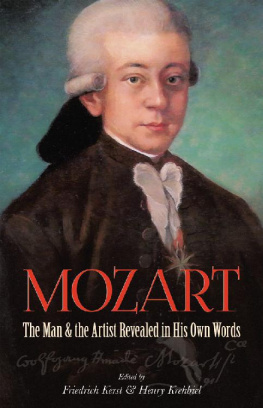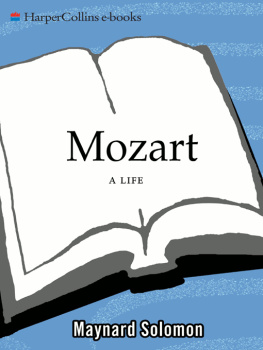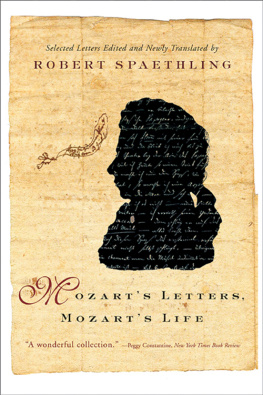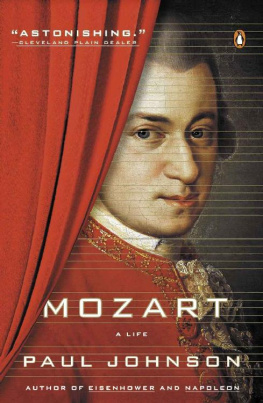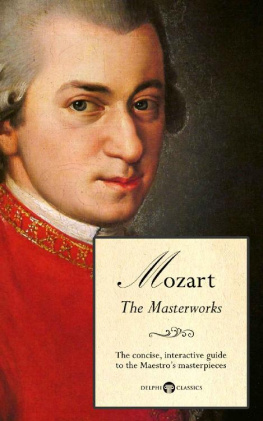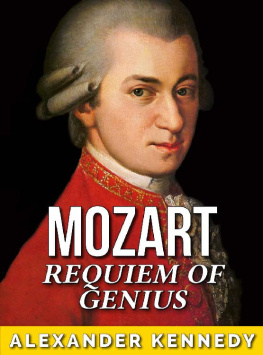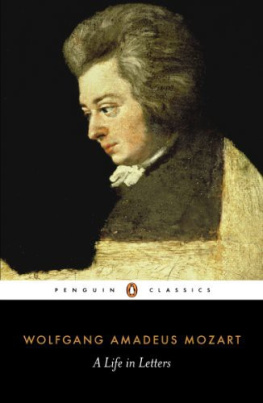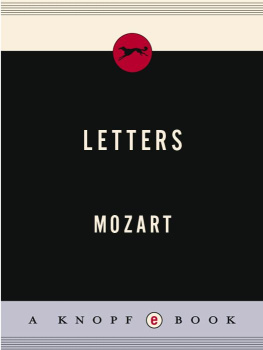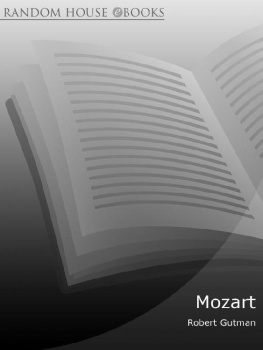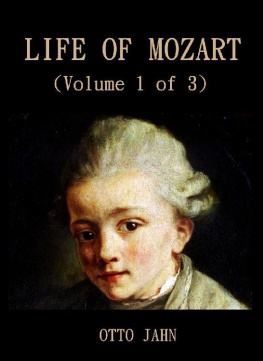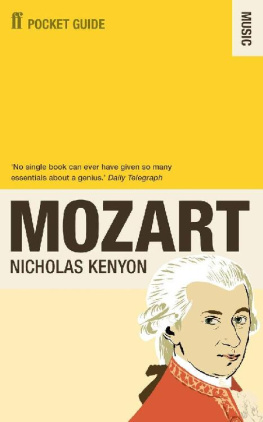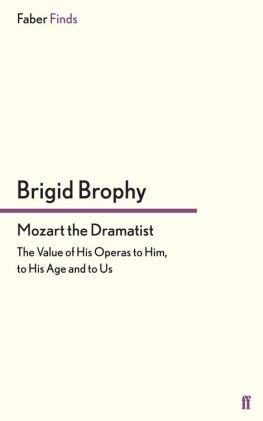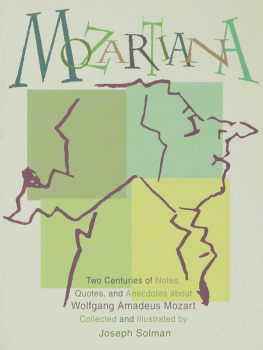MOZART
The Man and the Artist Revealed in His Own Words
MOZART
The Man and the Artist Revealed in His Own Words
Compiled and annotated by
Friedrich Kerst
Translated into English, and Edited, with Additional Notes, by
Henry Edward Krehbiel
DOVER PUBLICATIONS, INC.
Mineola, New York
Bibliographical Note
This Dover edition, first published in 1965 and reissued in 2016, is an unabridged and unaltered republication of the work first published by Geoffrey Bles, London, in 1926.
International Standard Book Number
ISBN-13: 978-0-486-21316-3
ISBN-10: 0-486-21316-1
Library of Congress Catalog Card Number: 64-18855
Manufactured in the United States by RR Donnelley
21316118 2016
www.doverpublications.com
EDITORS NOTE
The purpose and scope of this little book will be obvious to the reader from even a cursory glance at its contents. It is, in a way, an autobiography of Mozart written without conscious purpose, and for that reason peculiarly winning, illuminating and convincing. The outward things in Mozarts life are all but ignored in it, but there is a frank and full disclosure of the great musicians aristic, intellectual and moral character, made in his own words.
The Editor has not only taken the trouble to revise the work of the German author and compiler, but, for reasons which seemed to him imperative has also made a new translation of all the excerpts. Most of the translations of Mozarts letters which have found their way into the books betray want of familiarity with the idioms and colloquialisms employed by Mozart, as well as understanding of his careless, contradictory and sprawling epistolary style. Some of the intimacy of that style the new translation seeks to preserve, but the purpose has chiefly been to make the meaning plain.
H. E. K.
New York, June 7, 1905
CONTENTS
MOZART
The Man and the Artist Revealed in His Own Words
THE SIGNIFICANCE OF MOZART
Mozart! What a radiance streams from the name! Bright and pure as the light of the sun, Mozarts music greets us. We pronounce his name and behold! the youthful artist is before us,the merry, light-hearted smile upon his features, which belongs only to true and nave genius. It is impossible to imagine an aged Mozart,an embittered and saddened Mozart,glowering gloomily at a wicked world which is doing its best to make his lot still more burdensome;a Mozart whose music should reflect such painful moods.
Mozart was a Child of the Sun. Filled with a humor truly divine, he strolled unconstrainedly through a multitude of cares like Prince Tamino through his fantastic trials. Music was his talisman, his magic flute with which he could exorcise all the petty terrors that beset him. Has such a man and artistone who was completely resolved in his works, and therefore still stands bodily before us with all his glorious qualities after the lapse of a centuryhas Mozart still something to say to us who have just stepped timidly into a new century separated by another from that of the composer? Much; very much. Many prophets have arisen since Mozarts death; two of them have moved us profoundly with their evangel. One of them knew all the mysteries, and Nature took away his hearing lest he proclaim too much. We followed him into all the depths of the world of feeling. The other shook us awake and placed us in the hurly-burly of national life and striving; pointing to his own achievements, he said: If you wish it, you have now a German art! The one was Beethoven,the other Wagner. Because their music demands of us that we share with it its experiences and struggles, they are the guiding spirits of a generation which has grown up in combat and is expecting an unknown world of combat beyond the morning mist of the new century.
But we are in the case of the man in the fairy tale who could not forget the merry tune of the forest bird which he had heard as a boy. We gladly permit ourselves to be led, occasionally, out of the rude realities that surround us, into a beautiful world that knows no care but lies forever bathed in the sunshine of cloudless happiness,a world in which every loveliness of which fancy has dreamed has taken life and form. It is because of this that we make pilgrimages to the masterpieces of the plastic arts, that we give heed to the speech of Schiller, listen to the music of Mozart. When wearied by the stress of life we gladly hie to Mozart that he may tell us stories of that land of beauty, and convince us that there are other and better occupations than the worries and combats of the fleeting hour. This is what Mozart has to tell us to-day. In spite of Wagner he has an individual mission to fulfill which will keep him immortal. That of which Lessing convinces us only with expenditure of many words sounds clear and irresistible in The Magic Flute:the longing for light and day. Therefore there is something like the glory of daybreak in the tones of Mozarts opera; it is wafted towards us like the morning breeze which dispels the shadows and invokes the sun.
Mozart remains ever young; one reason is because death laid hold of him in the middle of his career. While all the world was still gazing expectantly upon him, he vanished from the earth and left no hope deceived. His was the enviable fate of a Raphael, Schiller and Krner. As the German (tis Schumanns utterance) thinks of Beethoven when he speaks the word symphony, so the name of Mozart in his mind is associated with the conception of things youthful, bright and sunny. Schumann was fully conscious of a purpose when he called out, Do not put Beethoven in the hands of young people too early; refresh and strengthen them with the fresh and lusty Mozart. Another time he writes: Does it not seem as if Mozarts works become fresher and fresher the oftener we hear them?
The more we realize that Wagner places a heavy and intoxieating draught before us, the more we shall appreciate the precious mountain spring which laves us in Mozarts music, and the less willing we shall be to permit any opportunity to pass unimproved which offers us the crystal cup. In the mind of Goethe genius was summed up in the name of Mozart. In a prophetic ecstasy he spoke the significant words: What else is genius than that productive power through which deeds arise, worthy of standing in the presence of God and Nature, and which, for this reason, bear results and are lasting? All the creations of Mozart are of this class; within them there is a generative force which is transplanted from generation to generation, and is not likely soon to be exhausted or devoured.
CHIPS FROM THE WORKSHOP
If one has the talent it pushes for utterance and torments one; it will out; and then one is out with it without questioning. And, look you, there is nothing in this thing of learning out of books. Here, here and here [pointing to his ear, his head and his heart] is your school. If everything is right there, then take your pen and down with it; afterward ask the opinion of a man who knows his business.
To a musically talented boy who asked Mozart how one might learn to compose.
I can not write poetically; I am no poet. I can not divide and subdivide my phrases so as to produce light and shade; I am no painter. I can not even give expression to my sentiments and thoughts by gestures and pantomime; I am no dancer. But I can do it with tones; I am a musician. I wish you might live till there is nothing more to be said in music.
Mannheim, November 8, 1777, in a letter of congratulation to his father, who was born on November 14, 1719. Despite his assertion, Mozart was an admirable dancer and passionately devoted to the sport. [So says Herr Kerst, obviously misconceiving Mozarts words. It is plain to me that the composer had the classic definition of the dance in mind when he said that he was no dancer. The dance of which he was thinking was that described by Charles Kingsley. A dance in which every motion was a word, and rest as eloquent as motion; in which every attitude was a fresh motive for a sculptor of the purest school, and the highest physical activity was manifested, not as in coarse pantomime, in fantastic bounds and unnatural distortions, but in perpetual delicate modulations of a stately and self-sustained grace. H. E. K.]
Next page
